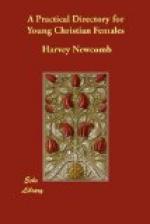You will hear such persons prating much of independence of mind. They have respect to the opinions of the ancients? Not they! They think for themselves; and form their own opinions without respect to what others have thought, and said, and written. They would scorn to consult a commentary to assist them in determining a difficult passage of Scripture, or the writings of a learned divine, to help them out of a theological difficulty. That would be subjecting their minds to the influence of prejudice, or betraying a want of confidence in their own infallible powers!—which is the last idea they would think of entertaining. The long-cherished opinions of great, and wise, and good men, are disposed of with a sneer. They be influenced by great names? Not they!
You will hear them delivering their opinions, pragmatically, and with strong assurance, on points of great difficulty, which good men of the greatest learning and ability have approached with diffidence; and boldly advancing ideas which they suppose to have originated in the depths of their own recondite minds, which they afterwards learn, with chagrin, are but some old, cast-off, crude theories or speculations, which had been a hundred times advanced, and as many times refuted, before they were born. But the matter appears so plain to them that they cannot imagine how any honest mind can come to any other conclusion. Hence, they are ready to doubt the piety of all who differ with them, if not to assume the office of judge, and charge them with insincerity or hypocrisy. Whereas, in truth, their strong confidence in their opinions arises from having examined the subject partially and superficially, and overlooked the objections and difficulties which readily occur to a well-balanced and discriminating mind.
I would not, however, be understood to recommend implicit submission to the judgment and opinions even of the greatest or even the best of men. This is Popery. The mind must be convinced before it yields assent to any position. But it would be the height of self-conceited arrogance for any person, but especially for a youth, to presume himself too wise to gain instruction from the writings of men who have devoted their lives to the investigation of truth; or summarily to set aside, as unworthy of his attention, opinions which have been embraced by the greatest and best of men for successive generations. Nor does it argue any uncommon independence of mind; for, you will generally find such persons arranged under the banner of some one of the various schools of theology, morals, philosophy, or politics, and following on with ardor the devious course of their leader receiving whatever falls from his lips as the voice of an oracle, and running with enthusiasm into all his extravagances. Like the vane upon the spire, that lifts up itself with proud eminence to the clouds, they are ready to be carried about by every wind of doctrine. Whereas true independence of mind consists in weighing evidence and argument impartially, and forming a decision independent of prejudice, party feeling, pride of opinion, or self-will; and, when coupled with humility, it will always rejoice to receive instruction from any source. The person who knows himself will be deeply humbled under a sense of his own weakness and ignorance, and will advance his opinions with modesty, while he treats the opinions of others with becoming respect.




